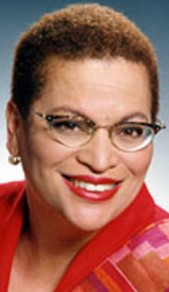
Stop normalizing anti-Blackness

Autumn Robeson Monahan is a 17-year-old Black girl attending high school in Slaton, Texas. The senior, who transferred to Slaton High School when her parents relocated there from Ohio, hoped to be her high school valedictorian based on her stellar grades. Instead, she was subjected to regular, vile, racist harassment from White students who showered her with the n—r word, even when she respectfully asked them to “please stop.”
From where I sit, the constant use of the “n” word is assaultive and aggressive. Autumn complained to school administrators, who did nothing even though there was a policy that students who used such slurs would be suspended. Instead, the young lady was subjected to multiple verbal assaults and attempted to handle her challenges by asking offending White students to stop using the word. Their Caucacity was rampant. They ignored her requests, and one day she snapped, yelling and slapping the fellow student who seemed to find the use of a racial slur amusing.
Nobody condones violence, and the use of the N—word is violent. School administrators chose to take no action against the unnamed White boy (who deserves suspension and more, and his parents should be reported to Child Protective Services for raising such a little monster) but suspended Autumn for 45 days, sentencing her to an “alternative” facility where students are required to wear orange jumpsuits (talk about the school to prison pipeline) and subjected to extreme so-called discipline.
Rather than submit to such extreme insanity, Autumn ran away from home and was considered a suicide risk. Her parents have filed a lawsuit against the school district and complained to the Department of Education. Still, this amazing young lady has had her high school senior year interrupted and besmirched. And the toxic little White boy who taunted her mercilessly has experienced no consequences. We don’t even know his name.
Anti-Blackness is at a peak, and it is disgustingly virulent. Black people are being openly massacred by so-called law enforcement officers who face few consequences for their murderous ways. They claim they fear for their lives. What did Autumn fear when, after enduring racist harassment, she snapped? Who wouldn’t snap after the madness? And why is this so acceptable? High school administrators say the n—word is “only a word.” But it is also the last word our ancestors heard before they were lynched. It is the word that was used to marginalize and criminalize. It is a word that sometimes seeps into the lexicon, a word that some say stings less when uttered as “nigga” instead of “n—r.” But it is also a word that is historically objectionable.
The White administrators who said a word is just a word aren’t so weak on enforcement when other ethnic slurs are used. They wouldn’t say a word was just a word if they were called out of their name. When a young girl complains about racist hazing, administrators need to stop it. They should not protect the intellectually challenged White boy who insisted that he could use slurs because he was empowered to do so.
Autumn complained. Her parents complained. Nothing happened. The young lady felt powerless and alone. The entire school system is at fault because they looked away from the madness of racial hazing. But we are also all at fault because we have normalized anti-Blackness.
Racist violence, whether verbal or physical, is the norm in this nation. It seems okay for white folks to haze, harass, and demean Black people. It is unacceptable, and there need to be consequences, not just for those who attacked and hazed Autumn, but for all of those who choose to haze and attack Black children in education systems all over the nation. Too many people think that racism is “no big thing”. It’s not a big thing for ignorant, myopic, and unaffected people. But for Autumn, an ambitious young woman, who has been scarred by these incidents because myopically ignorant White administrators failed to take action, it’s a big thing.
What action can we take as a collective? What can we do? As we end the year and make those empty resolutions, let’s make one with teeth. Let’s resolve to put an end to virulent anti-Blackness. Let’s support Autumn and every young student dealing with racist administrators. Let’s work to get them out of the jobs they do not deserve. Let’s say no more as emphatically as we can.
Dr. Julianne Malveaux is an economist, author and dean of the College of Ethnic Studies at California State University at Los Angeles.







